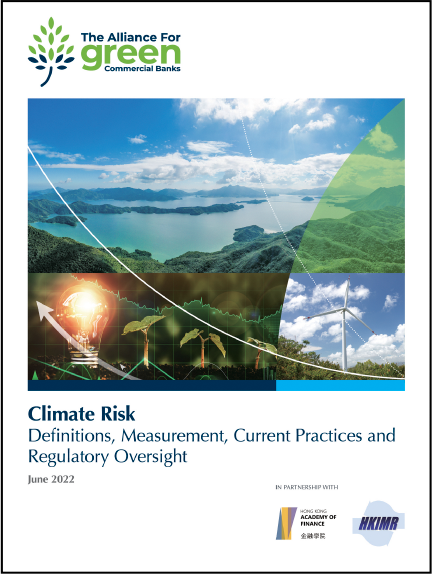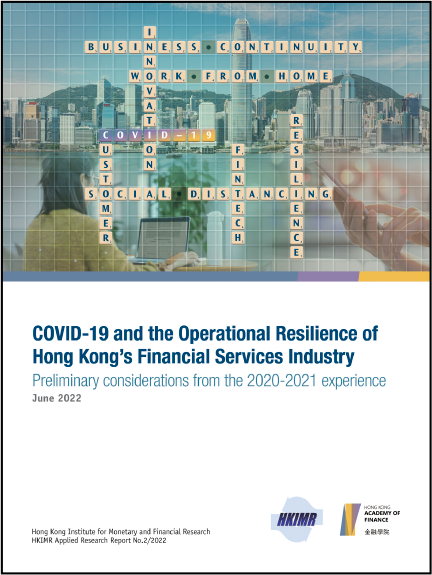
Interview of CEO
 The Hong Kong Academy of Finance (AoF)
celebrates its 3 rd anniversary in June 2022. On this
occasion, we interviewed Mr KC Kwok, CEO of the
AoF. In the interview, Mr Kwok highlights some key
developments of the AoF in the past 3 years.
The Hong Kong Academy of Finance (AoF)
celebrates its 3 rd anniversary in June 2022. On this
occasion, we interviewed Mr KC Kwok, CEO of the
AoF. In the interview, Mr Kwok highlights some key
developments of the AoF in the past 3 years.
Host
KC
KC
Host
KC
 Given these changes in the macro environment,
the AoF has been focusing on three strategic
themes in its activities, namely Fintech &
Digitalisation, Green Finance & ESG, and GBA &
China. These are the areas where most of our
stakeholders are interested in and where we
could add value.
The pandemic has forced us to move most of
our activities online. But we have turned this
into an opportunity to expand our reach. We
invited a number of prominent overseas
speakers to speak to us via webinars. We have expanded significantly our list of
“Friends
of AoF”, who would be invited to our activities particularly the online events. These
efforts,
in turn, have established AoF’s name both in Hong Kong and in the region.
Through online financial platforms, we have also successfully reached a very large audience in Mainland China. Our webinar on RMB exchange rate formation mechanism and exchange rate outlook held in mid-2021, for example, attracted close to 1.16 million viewers and our June 2022 webinar on China’s property sector attracted close to 1.13 million. These webinars in Putonghua were also livestreamed in English through simultaneous interpretation in international financial platforms such as Bloomberg, giving the audience around the world access to the views of prominent Mainland Chinese speakers.
Given these changes in the macro environment,
the AoF has been focusing on three strategic
themes in its activities, namely Fintech &
Digitalisation, Green Finance & ESG, and GBA &
China. These are the areas where most of our
stakeholders are interested in and where we
could add value.
The pandemic has forced us to move most of
our activities online. But we have turned this
into an opportunity to expand our reach. We
invited a number of prominent overseas
speakers to speak to us via webinars. We have expanded significantly our list of
“Friends
of AoF”, who would be invited to our activities particularly the online events. These
efforts,
in turn, have established AoF’s name both in Hong Kong and in the region.
Through online financial platforms, we have also successfully reached a very large audience in Mainland China. Our webinar on RMB exchange rate formation mechanism and exchange rate outlook held in mid-2021, for example, attracted close to 1.16 million viewers and our June 2022 webinar on China’s property sector attracted close to 1.13 million. These webinars in Putonghua were also livestreamed in English through simultaneous interpretation in international financial platforms such as Bloomberg, giving the audience around the world access to the views of prominent Mainland Chinese speakers.
Host
KC
Host
KC
Host
KC
Host
KC

AoF 3rd Anniversary Video

Financial Leaders Programme

1) Welcoming session on 30 March

2) Dialogue with Richard Lancaster, CEO of CLP Holdings Limited

3) Dialogue with Eddie Yue, CE of HKMA


Distinguished Speakers Series
Prof Michael Spence, Nobel Laureate in Economics



HKIMR x AoF Expert Speakers Series
Joseph Yam, AoF Fellow
Huang Yiping, Peking University

Qin Hong, Renmin University of China


Collaborative Event
AoF x CPA Australia Joint Webinar -
Opportunities and Challenges of the Wealth Management Connect


HKIMR Research
1) Climate Risk: Definitions, Measurement, Current Practices and Regulatory Oversight
-
Climate risk can disrupt financial institutions’ operations, lending and underwriting activities, and investments in affected securities. Research findings show that it also affects the prices of real estate, equities, and bonds.
-
Various climate risk indicators and scenario-based methods are being developed to measure climate risk. However, challenges still exist due to the availability, reliability and comparability of data and methods.
-
Regulators are developing mandatory and standardised climate risk disclosure frameworks. Climate stress tests are being conducted to assess the resilience of the financial system to climate risk.
-
The paper also highlights the importance of raising the awareness of climate risk, adopting a holistic and coherent approach to address climate risk, and developing capabilities in capacity, resources, and expertise to face challenges that climate risk may pose in the future.

2) COVID-19 and the Operational Resilience of Hong Kong’s
Financial Services Industry: Preliminary Considerations
from the
2020-2021 Experience
-
Our survey finds that 85% of financial institutions had incorporated pandemics in their business continuity plans before 2020, and some adopted hybrid work models in 2020-2021.
-
Policy support, financial and data infrastructure and the accelerated adoption of financial innovations have played a critical role in helping financial institutions enhance operational resilience.
-
Survey respondents viewed hybrid work models and digital channels to become increasingly important. They would also continue to adopt financial innovations and support industrywide data sharing initiatives.

3) HKIMR Working Papers



Upcoming Events
26 jul
Distinguished Speakers Series
Lord Mervyn King
Former Governor,
Bank of England

Mr Norman T.L. Chan
Senior Adviser, AoF






